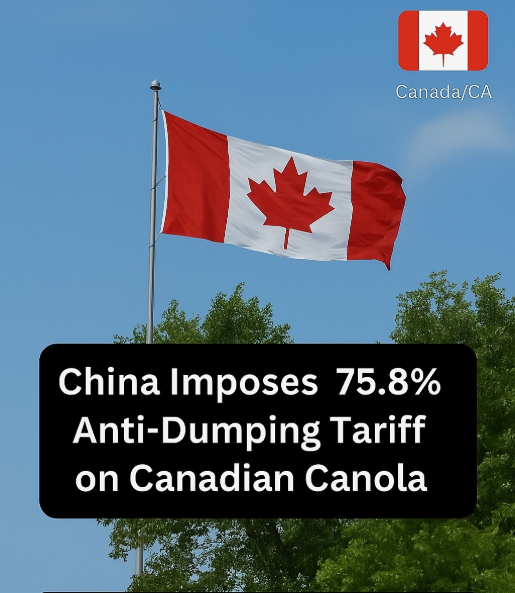Physical Address
304 North Cardinal St.
Dorchester Center, MA 02124
Physical Address
304 North Cardinal St.
Dorchester Center, MA 02124

Ottawa – August 2025 — In a major escalation of trade tensions, China has announced a 75.8% anti-dumping tariff on Canadian canola, a move that could have significant repercussions for Canada’s agriculture sector and export economy.
The decision, unveiled by China’s Ministry of Commerce, claims that Canadian canola is being sold in China at prices below market value, harming domestic producers. The steep tariff will effectively make Canadian canola uncompetitive in one of its largest overseas markets.
Canada is the world’s largest exporter of canola, with China traditionally being one of its biggest buyers. This tariff threatens to sharply reduce demand, potentially leaving Canadian farmers with a surplus and pushing down domestic prices.
Farm organizations have warned that the measure could cost hundreds of millions of dollars in lost sales and force many producers to seek alternative markets.
The Canadian federal government has expressed deep concern over the decision, calling the move “unwarranted and unfair.” Trade Minister [Insert Name] stated that Ottawa will be working closely with industry leaders and international partners to explore dispute resolution through the World Trade Organization (WTO) and to expand sales to other regions.
“Canadian canola is among the highest quality in the world, and our farmers operate under strict environmental and safety standards. This tariff is not justified,” the minister said.
This development comes amid a period of strained Canada–China relations, with disputes over agriculture, energy, and foreign policy playing out over the past few years. While canola has been a flashpoint before — with temporary bans in 2019 over pest concerns — this marks one of the most severe trade penalties imposed by Beijing on Canadian agricultural products.
Industry analysts say that Canadian exporters will likely pivot toward other growing markets such as Japan, the European Union, and Southeast Asia. However, these markets may not be able to fully absorb the volume previously sold to China, meaning lower prices for farmers in the near term.
The Canadian Canola Growers Association has urged the federal government to respond quickly with support programs for affected producers, while also redoubling efforts to promote Canadian canola globally.
With harvest season approaching, the timing of this tariff adds urgency to finding alternative buyers — and may influence planting decisions for years to come.